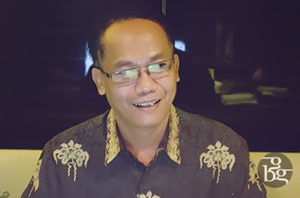
Interview with Dr. Andi Desfiandi of IBI Darmajaa, Indonesia GBG
IBI Darmajaya is a leading institution of higher education based in Lampung, South Sumatra that currently has faculties in business and economics, as well as computer science. What more can you tell us about Darmajaya’s background and its main strategies going forward?
IBI Darmajaya was first established in 1995, and during our formative years we were focused on providing tertiary education in the field of informatics and computer science, as can be seen in our decision to found a School of Computer Science in 1997. From this platform we expanded into economics following the establishment of a School of Economics in 2001. In 2008 we merged these two schools into a single institution under the name Informatics & Business Institute [IBI] Darmajaya.
The next stage in our ongoing evolution will see us become a university, and we expect that this will take place between 2015 and 2016 following the addition of more faculties. New faculties currently being proposed include psychology, law, agribusiness, electrical engineering, and communication science. This decision to expand is in keeping with the demand from students in the Lampung area who are keen to attend Darmajaya but would benefit from a wider selection of courses and programmes.
How does IBI Darmajaya differentiate itself within an extremely competitive higher education sector in Indonesia?
Our institution takes pride in the fact that we are ISO 9001 certified, and this certification encompasses all of our day-to-day operations from student applications to graduation. We are very much focused on ensuring that the process behind our learning system and curriculum meets international standards, because we believe that this is the key to producing skilled graduates. Providing education of the highest quality has always been and will continue to be our number one priority. To make sure that this is the case, our institution has a government-certified quality assurance centre.
IBI Darmajaya also stands out within Indonesia’s crowded higher education sector as an institution that places a great emphasis on research. Our research centre was one of only 50 in Indonesia to have received the Madia award from the government. We were also one of only 150 in the country to be recognised by the government for excellence in internal quality assurance. Our institution is well-known for the implementation of the latest technology in IT to further the capabilities and efficiency of our internal operations, and received an award for this from TESCA in 2014.
Much is expected of the new government to improve upon education in Indonesia. In your view, what should the new administration prioritise in spurring the development of Indonesia’s higher education sector?
We agree with the popular assessment of Indonesia’s education sector, in the sense that it is clear that the country has been left behind on the international as well as regional level. Only 8% of Indonesia’s population holds a bachelor’s degree – a figure that is far too low and does not even take into consideration the fact that the country also struggles to match the quality of education offered abroad. As such, we are glad to see that the new President Joko Widodo has been vocal about his plans to address this challenge through a shift away from natural resources towards human resources as the driver of Indonesia’s economic growth. We therefore have high expectations for the new government, and as an institution of higher education are ready to adapt our curriculum in line with its vision for the future.
This will involve the introduction of courses that involve practical learning to complement a sound base of theoretical knowledge, in subjects that are best suited to meet industry demand for high-quality human resources.
Can you expand upon your strategy to create graduates ready to work and contribute to industries most in need of skilled human resources?
Our students are actively encouraged to innovate; in fact one of their requirements for their final project is to create something novel. The benefits of this to their development is clear to see, in that they become better prepared to offer new solutions to existing challenges faced by Indonesian industries. For example, to address the issue of overloaded trucks placing a strain on infrastructure such as bridges, our students developed a technology whereby a barrier is triggered if an overcapacity truck attempts to cross the bridge – a system that should mitigate the need for frequent costly repairs. Among our other recent innovations is the development of a new lie-detector technology that analyses facial cues instead of heart rate.
Many leading universities in Indonesia with plans to expand look to cooperate with world-class international universities. With this context in mind, how is IBI Darmajaya positioned towards working with overseas partners?
We realised many years ago that globalisation was inevitable and as such it would be unwise to resist the changes and opportunities that this brought about. This is why we first initiated collaboration with international partners in 2008 and this will remain a central part of our strategy going forward. At present we have cooperated with universities in Japan, Thailand, Vietnam, Malaysia, India and South Korea to offer double degree and fast track programmes, as well as student and faculty exchange, art and culture exchange, and research collaboration. Our institution has also worked with the government of South Korea, which provided us with a grant to develop a sophisticated IT lab. We plan to expand upon this existing network of international partners for the future. We see the most potential in working with universities based in China and Europe. One avenue to develop these ties is through cooperating with embassies in Indonesia, and we are already cooperating with the Embassy of France, which helped us to
set up an on-campus ‘France Corner’ also known as Warung Perancis.
One of the reasons that we have been so active in seeking out international partners is that doing so serves as an added incentive to continue to improve upon the quality of our student’s learning experience and our internal operations. Working with foreign universities provides us with a higher benchmark to strive towards, and this will accelerate our development into a leading university.
As a final message, what would you like Global Business Guide’s readers to remember about IBI Darmajaya?
Indonesia is one of the world’s largest countries by population but only a small percentage of Indonesians have graduated from university. The market for higher education therefore has immense potential going forward as the country attempts to raise its number of bachelor’s degree holders from 8% to 20% of the population over the next five years. This target will not be easy to reach, and will require plenty of effort and funds. We therefore hope to cooperate with other countries to achieve our dreams.

